Unit 15 We’re trying to save the manatees!(Section A 3a-4)
文档属性
| 名称 | Unit 15 We’re trying to save the manatees!(Section A 3a-4) |

|
|
| 格式 | zip | ||
| 文件大小 | 577.2KB | ||
| 资源类型 | 教案 | ||
| 版本资源 | 人教新目标(Go for it)版 | ||
| 科目 | 英语 | ||
| 更新时间 | 2012-02-22 00:00:00 | ||
图片预览

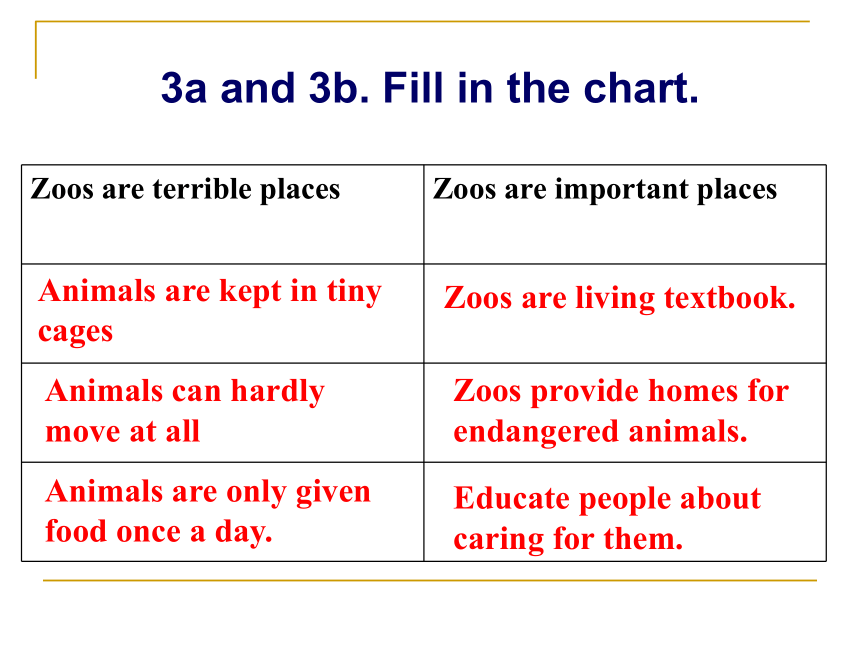
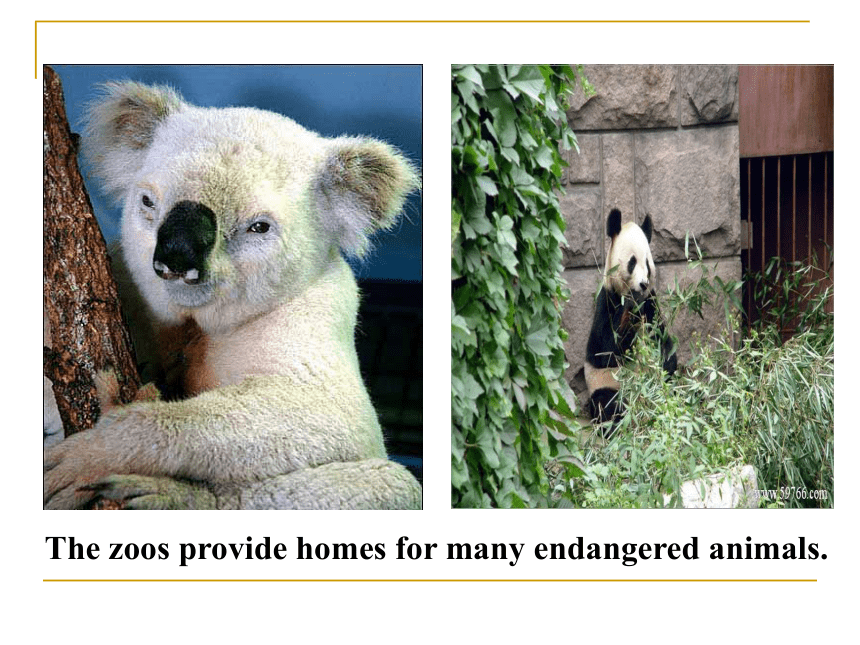
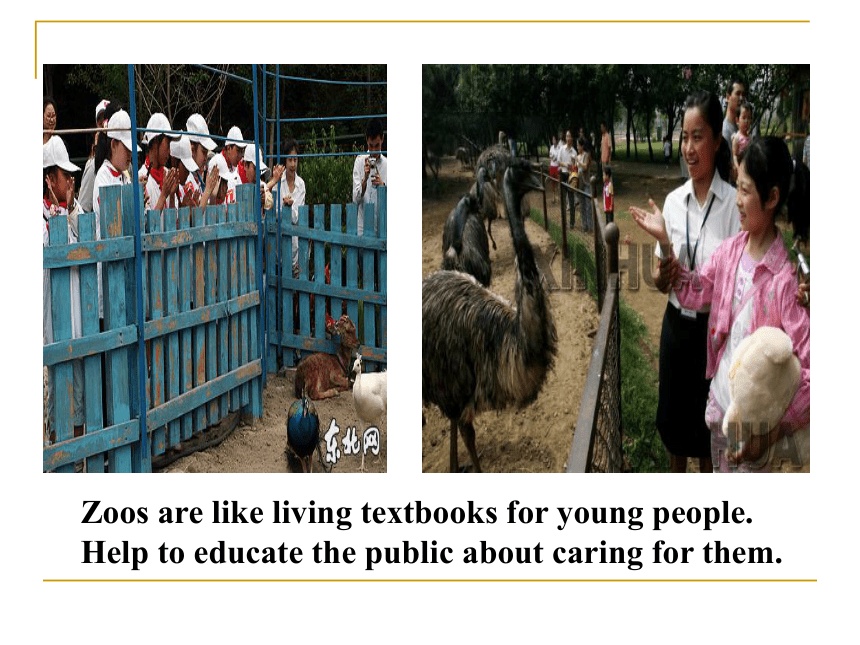
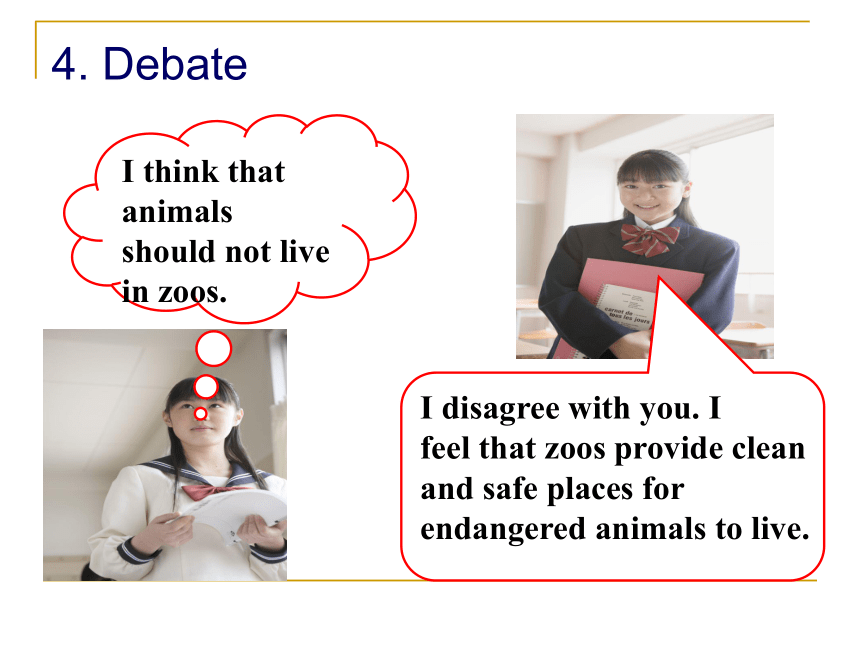
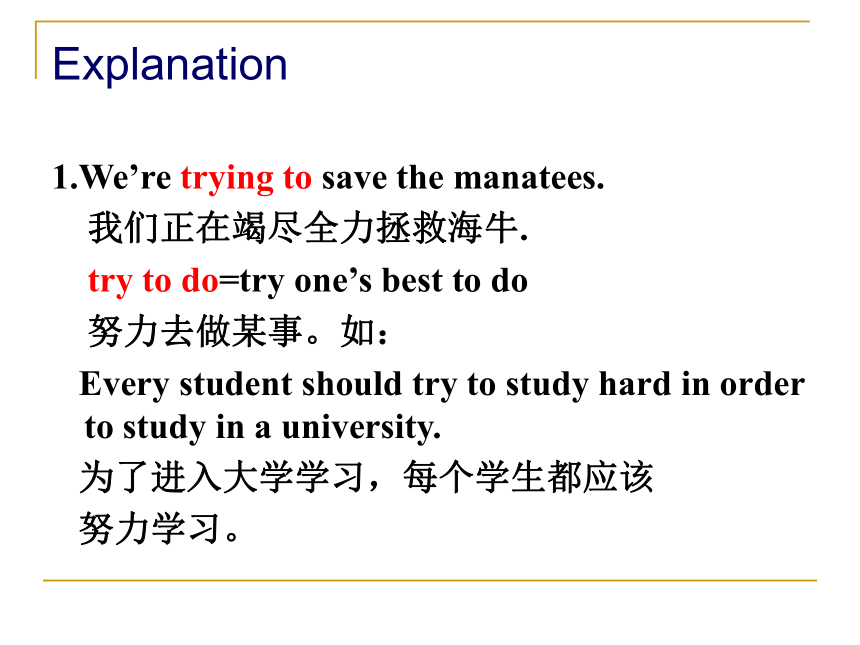
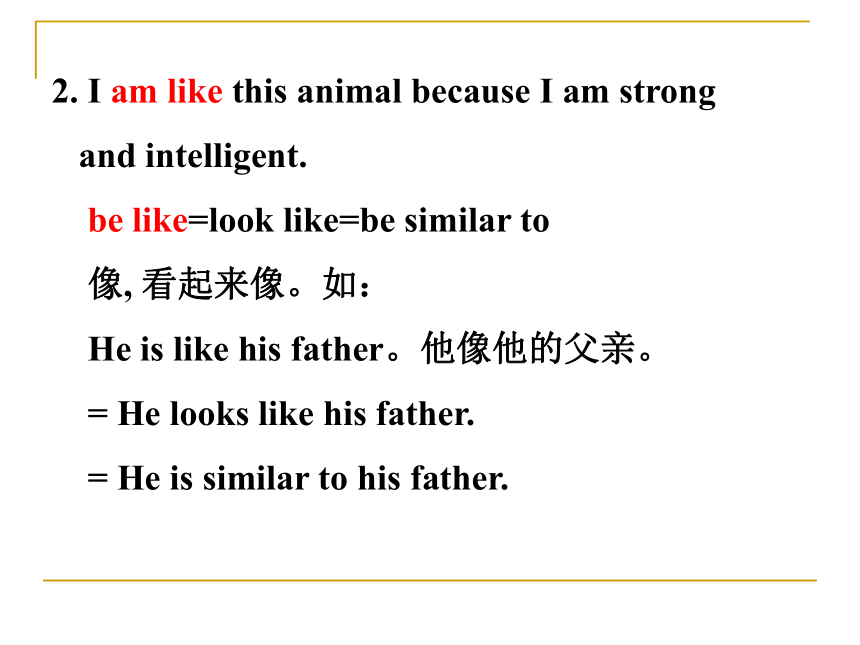
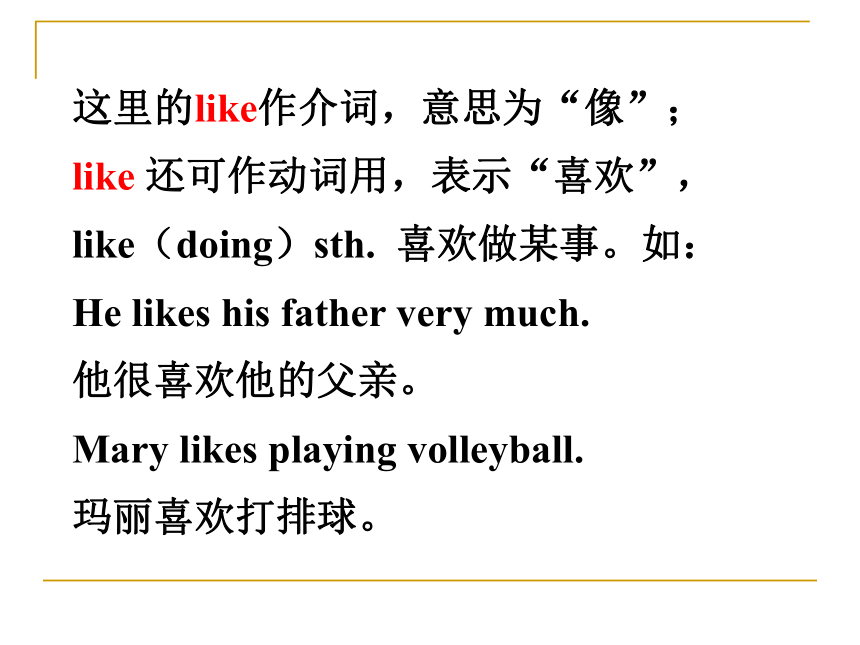
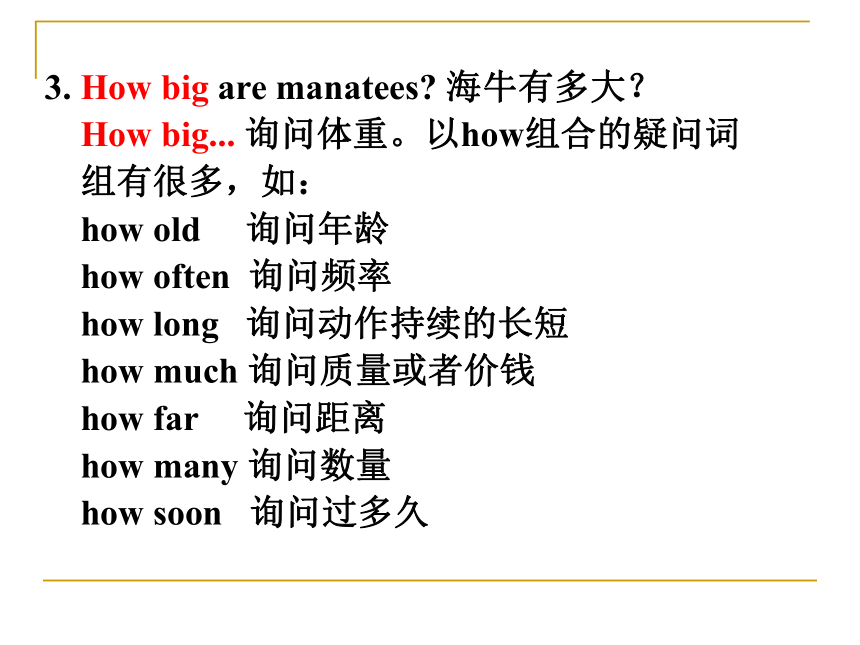
文档简介
(共25张PPT)
十五单元第二课时
Zoos are terrible places Zoos are important places
3a and 3b. Fill in the chart.
Animals are kept in tiny cages
Animals can hardly move at all
Animals are only given food once a day.
Zoos are living textbook.
Zoos provide homes for endangered animals.
Educate people about caring for them.
The zoos provide homes for many endangered animals.
Zoos are like living textbooks for young people.
Help to educate the public about caring for them.
4. Debate
I think that animals should not live in zoos.
I disagree with you. I
feel that zoos provide clean
and safe places for
endangered animals to live.
Explanation
1.We’re trying to save the manatees.
我们正在竭尽全力拯救海牛.
try to do=try one’s best to do
努力去做某事。如:
Every student should try to study hard in order to study in a university.
为了进入大学学习,每个学生都应该
努力学习。
2. I am like this animal because I am strong
and intelligent.
be like=look like=be similar to
像, 看起来像。如:
He is like his father。他像他的父亲。
= He looks like his father.
= He is similar to his father.
这里的like作介词,意思为“像”;
like 还可作动词用,表示“喜欢”,
like(doing)sth. 喜欢做某事。如:
He likes his father very much.
他很喜欢他的父亲。
Mary likes playing volleyball.
玛丽喜欢打排球。
3. How big are manatees 海牛有多大?
How big... 询问体重。以how组合的疑问词
组有很多,如:
how old 询问年龄
how often 询问频率
how long 询问动作持续的长短
how much 询问质量或者价钱
how far 询问距离
how many 询问数量
how soon 询问过多久
4. …they weigh about 1,000 pounds,
……他们大约重1000磅。
weigh, 动词, “称……重量, 测……重量”。
e.g. He weighed the stone in his hand.
他用手掂了掂这块石头的重量。
The piece of meat weighs four pounds.
这块肉重四磅
weigh的名词形式是weight, “重量”。
e.g. What is your weight?
你的体重是多少?
5. I’m writing to say that I am against building
a new zoo in our town.
(1) against 介词, 反对, 违反,与……相反
(=opposite)。
e.g. Are most people against the proposal
大多数人反对这项提议吗
(2) against介词还有触,碰,倚,靠的意思。
e.g. Put the piano there, with its back, against
the wall.
把钢琴放在那里,背靠着墙.
(3) be against doing sth. 反对做某事
反义词组是 be for doing sth. 赞成某事
e.g. All the people around the world are against
cloning human beings.
全世界的人民反对克隆人类。
All of us are for peace and against war.
我们都赞成和平,反对战争。
6. I’ve visited a lot of zoos in my life, and I have
never seen one I liked or one that was suitable
for animals to live in.
(1) be suitable for sb to do sth. 表示 “适合某人
做某事”,这里suitable 是suit的形容词形式,
表示 “合适的”。
e.g.This kind of bamboo is not suitable for
pandas to eat.
这种竹子不适合给熊猫吃。
This dress suits you very much, but
unfortunately it doesn’t fit you.
这套女装款式非常适合你,只可惜大小不合适。
(2) to live in 在此处作animals的后置定语。英语
中动词不定式短语做名词定语,放在后面。
e.g. There is nothing for us to worry about.
我们没有什么可以担心的。
7. The animals are kept in tiny cages.
动物被关在极小的笼子里。
(1) tiny=little 很小的 ,带有感彩.
e.g. the tiny country 国家小 (含可爱的意思)
a small country 小国家(与large country
相对应)
a little boy 小男孩,爱怜之意(不含身材矮小)
(2) tiny 和 little常做定语,一般不做表语,
small 既可以做定语,也可以做表语。
little 还可表示 “一点点的”,修饰不可数名词。
e.g. There is a little milk in the bottle.
瓶里有一点点的牛奶。
8. I was surprised to find hardly anyone there.
我非常惊讶地发现在那几乎没有人
(1) surprised 在这里是过去分词做形容词。
常用词组:
be surprised at sth. 对某事感到惊讶
be surprised to do sth. 很惊讶地做某事
e.g. I was surprised at the news./to
hear the news.
听到这个消息我很吃惊。
(2) surprise作动词, “使……惊讶”, =amaze。
e.g. She is over 80 You surprised me!
她80多岁了?真想不到!
(3) surprise还可作名词, “惊奇,惊讶”,常用
词组有: in surprise 惊奇地
to one’s surprise 使某人惊奇地
e.g. To my surprise, the plan succeeded.
我感到惊奇的是那计划竟然成功了。
(4) surprising 形容词, 惊讶的,惊奇的。
(侧重指事物本身具有的特点)
e.g. His words surprised me.
他的话使我大吃一惊。
It is surprising news.
它是一个令人惊讶的消息。
9.They provide homes for many endangered
animals, and help to educate the public
about caring for them.
(动物园)他们为许多濒危的动物提供了家,
也有助于教育众人来关心这些动物。
(1) provide sb. with sth.
provide sth for sb. 提供给某人某物
e.g. The firm provided me with a car.
Can you provided accommodation for
thirty people
(2) provide for sb. 供应某人所需。如:
He worked hard to provide for their large
family.
他努力工作以供养一家人。
He has a large family to provide for.
他要养活一个大家庭。
(3) the public 指 “民众,公众”。在英语中,
定冠词the 后接形容词表示一类人。
e.g. the young 年轻人
the wounded 受伤的人
(4) care for sb. 可做 “照顾,照料,看护”的意思。
care for sth. “希望或喜欢(做某事)”。
e.g. care for the sick 照看病人
Would you care for a cup of tea
你要不要来杯茶
10. I urge all of your readers to visit our
wonderful zoo soon.
我们竭力主张你们所有的读者赶快来参观
我们的很棒的动物园。
(1) urge 作动词, “力劝, 鼓励, 怂恿, 极力主张,
强调”。
e.g. They urged us to go with them.
他们怂恿我们一起去。
She urged the important of speed.
她强调速度的重要性。
(2) urge 还可作名词, “强烈的欲望, 冲动”;
urgent 形容词, “紧急的”。
e.g. He has an urge to travel.
他有去旅行的强烈欲望。
(3) 词组: urge sth., on/upon sb.极力推荐
urge sb. on sth. 鼓励某人做某事
urge against 极力反对
十五单元第二课时
Zoos are terrible places Zoos are important places
3a and 3b. Fill in the chart.
Animals are kept in tiny cages
Animals can hardly move at all
Animals are only given food once a day.
Zoos are living textbook.
Zoos provide homes for endangered animals.
Educate people about caring for them.
The zoos provide homes for many endangered animals.
Zoos are like living textbooks for young people.
Help to educate the public about caring for them.
4. Debate
I think that animals should not live in zoos.
I disagree with you. I
feel that zoos provide clean
and safe places for
endangered animals to live.
Explanation
1.We’re trying to save the manatees.
我们正在竭尽全力拯救海牛.
try to do=try one’s best to do
努力去做某事。如:
Every student should try to study hard in order to study in a university.
为了进入大学学习,每个学生都应该
努力学习。
2. I am like this animal because I am strong
and intelligent.
be like=look like=be similar to
像, 看起来像。如:
He is like his father。他像他的父亲。
= He looks like his father.
= He is similar to his father.
这里的like作介词,意思为“像”;
like 还可作动词用,表示“喜欢”,
like(doing)sth. 喜欢做某事。如:
He likes his father very much.
他很喜欢他的父亲。
Mary likes playing volleyball.
玛丽喜欢打排球。
3. How big are manatees 海牛有多大?
How big... 询问体重。以how组合的疑问词
组有很多,如:
how old 询问年龄
how often 询问频率
how long 询问动作持续的长短
how much 询问质量或者价钱
how far 询问距离
how many 询问数量
how soon 询问过多久
4. …they weigh about 1,000 pounds,
……他们大约重1000磅。
weigh, 动词, “称……重量, 测……重量”。
e.g. He weighed the stone in his hand.
他用手掂了掂这块石头的重量。
The piece of meat weighs four pounds.
这块肉重四磅
weigh的名词形式是weight, “重量”。
e.g. What is your weight?
你的体重是多少?
5. I’m writing to say that I am against building
a new zoo in our town.
(1) against 介词, 反对, 违反,与……相反
(=opposite)。
e.g. Are most people against the proposal
大多数人反对这项提议吗
(2) against介词还有触,碰,倚,靠的意思。
e.g. Put the piano there, with its back, against
the wall.
把钢琴放在那里,背靠着墙.
(3) be against doing sth. 反对做某事
反义词组是 be for doing sth. 赞成某事
e.g. All the people around the world are against
cloning human beings.
全世界的人民反对克隆人类。
All of us are for peace and against war.
我们都赞成和平,反对战争。
6. I’ve visited a lot of zoos in my life, and I have
never seen one I liked or one that was suitable
for animals to live in.
(1) be suitable for sb to do sth. 表示 “适合某人
做某事”,这里suitable 是suit的形容词形式,
表示 “合适的”。
e.g.This kind of bamboo is not suitable for
pandas to eat.
这种竹子不适合给熊猫吃。
This dress suits you very much, but
unfortunately it doesn’t fit you.
这套女装款式非常适合你,只可惜大小不合适。
(2) to live in 在此处作animals的后置定语。英语
中动词不定式短语做名词定语,放在后面。
e.g. There is nothing for us to worry about.
我们没有什么可以担心的。
7. The animals are kept in tiny cages.
动物被关在极小的笼子里。
(1) tiny=little 很小的 ,带有感彩.
e.g. the tiny country 国家小 (含可爱的意思)
a small country 小国家(与large country
相对应)
a little boy 小男孩,爱怜之意(不含身材矮小)
(2) tiny 和 little常做定语,一般不做表语,
small 既可以做定语,也可以做表语。
little 还可表示 “一点点的”,修饰不可数名词。
e.g. There is a little milk in the bottle.
瓶里有一点点的牛奶。
8. I was surprised to find hardly anyone there.
我非常惊讶地发现在那几乎没有人
(1) surprised 在这里是过去分词做形容词。
常用词组:
be surprised at sth. 对某事感到惊讶
be surprised to do sth. 很惊讶地做某事
e.g. I was surprised at the news./to
hear the news.
听到这个消息我很吃惊。
(2) surprise作动词, “使……惊讶”, =amaze。
e.g. She is over 80 You surprised me!
她80多岁了?真想不到!
(3) surprise还可作名词, “惊奇,惊讶”,常用
词组有: in surprise 惊奇地
to one’s surprise 使某人惊奇地
e.g. To my surprise, the plan succeeded.
我感到惊奇的是那计划竟然成功了。
(4) surprising 形容词, 惊讶的,惊奇的。
(侧重指事物本身具有的特点)
e.g. His words surprised me.
他的话使我大吃一惊。
It is surprising news.
它是一个令人惊讶的消息。
9.They provide homes for many endangered
animals, and help to educate the public
about caring for them.
(动物园)他们为许多濒危的动物提供了家,
也有助于教育众人来关心这些动物。
(1) provide sb. with sth.
provide sth for sb. 提供给某人某物
e.g. The firm provided me with a car.
Can you provided accommodation for
thirty people
(2) provide for sb. 供应某人所需。如:
He worked hard to provide for their large
family.
他努力工作以供养一家人。
He has a large family to provide for.
他要养活一个大家庭。
(3) the public 指 “民众,公众”。在英语中,
定冠词the 后接形容词表示一类人。
e.g. the young 年轻人
the wounded 受伤的人
(4) care for sb. 可做 “照顾,照料,看护”的意思。
care for sth. “希望或喜欢(做某事)”。
e.g. care for the sick 照看病人
Would you care for a cup of tea
你要不要来杯茶
10. I urge all of your readers to visit our
wonderful zoo soon.
我们竭力主张你们所有的读者赶快来参观
我们的很棒的动物园。
(1) urge 作动词, “力劝, 鼓励, 怂恿, 极力主张,
强调”。
e.g. They urged us to go with them.
他们怂恿我们一起去。
She urged the important of speed.
她强调速度的重要性。
(2) urge 还可作名词, “强烈的欲望, 冲动”;
urgent 形容词, “紧急的”。
e.g. He has an urge to travel.
他有去旅行的强烈欲望。
(3) 词组: urge sth., on/upon sb.极力推荐
urge sb. on sth. 鼓励某人做某事
urge against 极力反对
同课章节目录
- Unit 1 How can we become good learners.
- Section A
- Section B
- Unit 2 I think that mooncakes are delicious!
- Section A
- Section B
- Unit 3 Could you please tell me where the restroom
- Section A
- Section B
- Unit 4 I used to be afraid of the dark.
- Section A
- Section B
- Unit 5 What are the shirts made of?
- Section A
- Section B
- Review of Units 1-5
- Unit 6 When was it invented?
- Section A
- Section B
- Unit 7 Teenagers should be allowed to choose their
- Section A
- Section B
- Unit 8 It must belong to Carla.
- Section A
- Section B
- Unit 9 I like music that I can dance to.
- Section A
- Section B
- Unit 10 You're supposed to shake hands.
- Section A
- Section B
- Review of Units 6-10
- Unit 11 Sad movies make me cry.
- Section A
- Section B
- Unit 12 Life is full of the unexpected
- Section A
- Section B
- Unit 13 We're trying to save the earth!
- Section A
- Section B
- Unit 14 I remember meeting all of you in Grade 7.
- Section A
- Section B
- Review of Units 11-14
